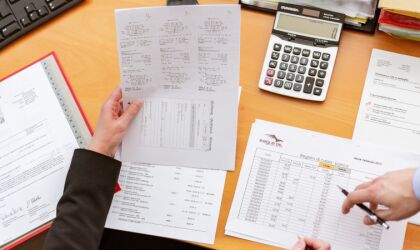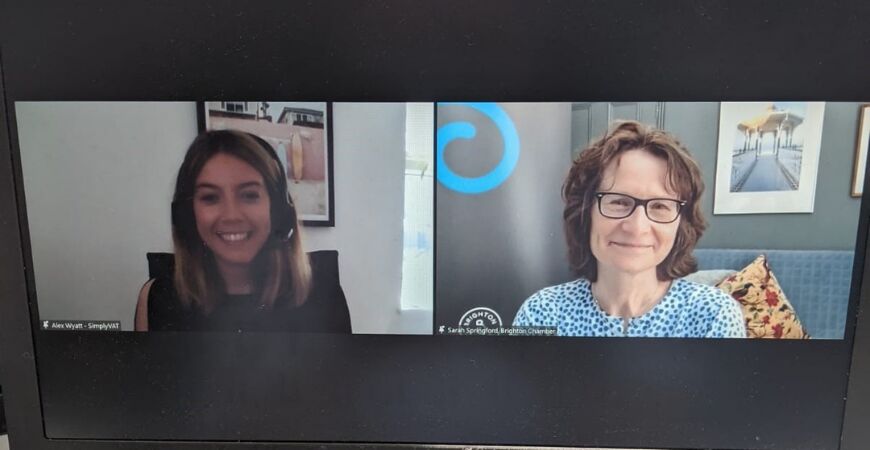

Wed 30 / 06 / 21
Simplifying the EU VAT changes for your eCommerce business
Writing after her Your Questions Answered for Brighton Chamber: Simplifying the EU VAT changes for your eCommerce business, Alex Wyatt of SimplyVAT.com shares the key points covered during the session.
By Alex Wyatt of SimplyVAT.com
Starting 1 July 2021, new VAT rules for ecommerce businesses selling goods and services (B2C) will come into effect throughout the EU. This reflects the consistent increase of digital and cross-border commerce on both websites and marketplaces.
The current EU VAT rules have been unable to keep up with the rapid expansion of ecommerce and as a result have created an unfair playing field between domestic and international sellers. This unfair advantage has been allowing overseas sellers to not always charge VAT on supplies they sell to EU consumers, so in order to make the markets fairer the EU is introducing new rules and simplifications.
The main principle of these new EU VAT reforms is to ensure VAT is always paid where customers are located. This will then be supported by simplification schemes that will reduce the administrative burden when reporting VAT. Marketplaces will also be given an increased role in charging and collecting VAT from EU based customers in certain scenarios.
MOSS to OSS
The MOSS (Mini One Stop Shop) Scheme is currently a means for businesses to account for VAT due on telecommunication, broadcasting and electronic (TBE) digital services sold to EU consumers. This scheme is now being extended to become OSS (One Stop Shop), which will be an electronic portal enabling businesses to account for VAT through a single electronic interface rather than register and report VAT in each EU member state where they sell.
OSS will also extend the range of B2C services that can be accounted for, including (but not limited to) hiring a means of transport and services related to property e.g. renovation and catering.
As an extension of MOSS, OSS will include a wider range of B2C supplies of goods and services. OSS will be split into two separate schemes, Union OSS and non-Union OSS. For goods and services between EU and non-EU businesses OSS eligibility will be as follows:
Union OSS
For intra-EU B2C distance sales of goods located in the EU at the point of sale:
- Eligible for EU businesses
- Eligible for non-EU businesses
For intra-EU B2C sales of services:
- Eligible for EU businesses
Non-Union OSS
For intra-EU B2C sales of services:
- Eligible for non-EU businesses
Businesses should determine if any of their B2C supplies qualify for the new schemes. The new OSS only covers B2C cross-border sales of goods and services, which means that if you are VAT registered due to holding stock, selling B2B, or reclaiming input/import taxes, you may need to keep your existing VAT registrations. The OSS VAT returns will be required in addition to any domestic VAT returns or additional reporting required for other types of supplies.
IOSS
The IOSS (Import One Stop Shop) Scheme is also an electronic portal available to EU and non-EU businesses that will enable users to account for VAT due on low value distance sales of imported goods. This scheme allows businesses as well as online marketplaces to report VAT due on B2C sales providing the consignment value does not exceed EUR150.
EU based businesses can IOSS register directly with their local tax authorities in the Member State their established. Non-EU businesses must appoint an EU-based intermediary in order to use IOSS.
Businesses using IOSS will need to apply the correct rate of VAT depending on where the customer is based and take payment for this at checkout.
In summary:
IOSS
For low value distance sales of imported goods with a consignment less than EUR 150:
- Eligible for EU and non-EU businesses
From July 1, 2021, all commercial goods imported into or sold within the EU will need to have VAT applied based on where the consumers are located. Although these schemes are optional, selling into the EU compliantly isn’t - reviewing your supply chain to identify your VAT liability and potential reporting obligations is essential to successfully trading in 2021.
Consider whether any of these schemes suit your ecommerce businesses and if you do decide to opt in, speak to one of our international VAT experts who can discuss your options, plan your next steps and help you get compliant today!
Alex Wyatt is Global Project Manager at SimplyVAT.com. She led a Your Questions Answered session for Brighton Chamber, as part of the From Brighton with Love business support programme - a package of support designed to help businesses through EU transition and give them the confidence to embark on international trade.
Find out more about From Brighton with Love, and other help and support available for your business when importing and exporting here.
If you want to contribute to the Chamber blog, contact us on hannah@brightonchamber.co.uk



